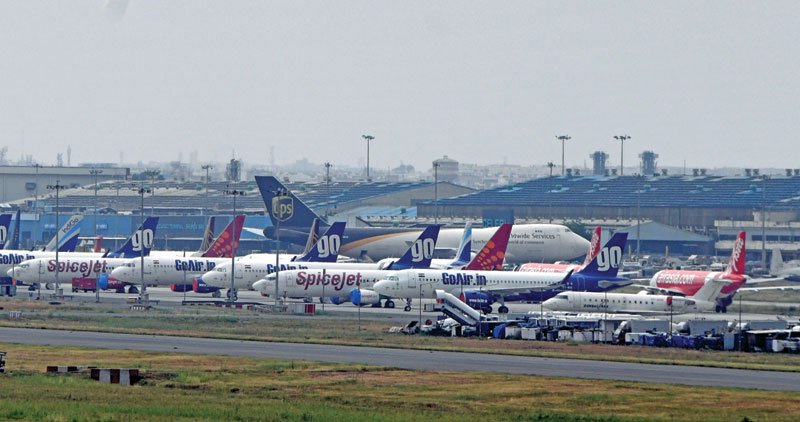Confidence of air travellers is important to get the aviation industry back on its feet
Palak Gupta
Boeing, in collaboration, with the US-India Aviation Cooperation Program (ACP) hosted a discussion on measures to build confidence in air travel in a post Covid-19 world. The webinar was titled ‘Restoring Confidence in Air Travel’.

To minimise the risk of virus transmission, the aviation and hospitality industries have taken several measures in constructing multiple layers of protection almost into every aspect of travel.
This includes contactless boarding experience for passengers, cleaning and disinfecting practices in an aircraft, minimising contaminants from spreading throughout the aircraft cabin through the careful design of the cabin air system and encouraging passengers to wear face coverings.
The US aerospace giant Boeing has also announced its Confident Travel Initiative where its team of experts will work with airlines, global regulators, industry stakeholders, flying passengers, infectious disease experts and behavioural specialists to establish industry-recognised safety recommendations.
The team is also advising operators on existing, EPA-approved disinfectants that are compatible with airplane flight decks and cabins and testing other sanitizers. Boeing airplanes utilise High Efficiency Particulate Air (HEPA) filters that trap 99.9+ per cent of particulates—including bacteria and viruses from re-circulated air and prevents them from re-circulating back to the cabin. Boeing is also focusing on longer-lead items that will serve as additional layers of protection to what’s already in place today. This includes existing UV technology and how it might be used to sanitise the flight deck, off the shelf anti-microbial coatings that provide a hostile environment for viruses and bacteria once it’s sprayed on surfaces and self-disinfecting airplane lavatory.
Stressing improved air travel health measures as the need of the hour, President, Boeing India, Salil Gupte said, “We are partnering with airlines, ministry of civil aviation, DGCA and the industry to create a multi-layered approach focused on keeping passengers and airline crews healthy. Layered protection requires a system-wide approach extending beyond the airplane to the full travel experience. Having consistent, industry-recognised safety standards and protocols will be an important part of recovery as travel resumes.”
The event was attended by ministry of civil aviation, ministry of tourism, International Civil Aviation Organisation (ICAO), Federal Aviation Administration (FAA), International Air Transport Association (IATA), Airports Authority of India (AAI), Incheon International Airport, GMR, IndiGo, Marriott International, and the Taj Hotels.
“The Covid-19 pandemic requires a joint effort to minimise air travel health risks and restore public confidence in travel and aviation. As air travel resumes and restrictions ease, the industry needs to partner and collaborate to develop new solutions, build on the existing best practices, and provide a safe travel experience to travellers. The safety and wellbeing of travellers, passengers and industry employees is a top priority for ACP and its members,” said programme director, US-India Aviation Cooperation Program Sandeep Bahl.
Civil aviation inarguably has been severely hit by Covid-19, which brought the sector literally to a virtual standstill since airport revenue generation is directly linked to the levels of traffic. India’s passenger traffic stood at 199.60 million in FY20 (April-October 2019).
Resumption of India’s domestic operations
On 25 May 2020, India recommenced domestic civil aviation operations in a ‘calibrated manner’. A ban on international flights is in place since March 22 to control the spread of Covid-19 and as of now in India, it is only Air India which is ferrying passengers in and out of the country under the Vande Bharat mission. No other flights have been allowed to resume international operations.
However, international operation of flights is likely to begin soon on selected routes. While the international operation will remain suspended till July 15, it may be allowed on selected routes on case to case basis. There have been huge demands for starting the international operation of flights.
In a bid to make civil aviation efficient, the administration decided that the Indian air space should be effectively used in a manner that flying time for travellers is reduced and airlines also save costs. This is being done in close cooperation with the Department of Military Affairs (DMA).
A time of unprecedented crisis
When the current pandemic struck, countries across the world announced nationwide lockdowns almost immediately and restricted air travel. On the manufacturing front, the pandemic has led to an inevitable disruption in global supply chains and production/ assembly lines which not only incurred financial losses but also the loss of human capital.
Adding to the woes is the recent verdict of India’s Supreme Court which seeks reply from ministry of civil aviation (MCA) on petitions seeking complete refund of airline tickets booked for flights during the lockdown phase.
Credit rating agency Crisil mentions in its report that airlines will be the worst-hit, contributing to more than 70 per cent of the losses, or about Rs 17,000 crore, followed by airport operators with Rs 5,000-5,500 crore, and airport retailers, including retail, food and beverages and duty-free, with Rs 1,700-1,800 crore.
You must be logged in to view this content.

